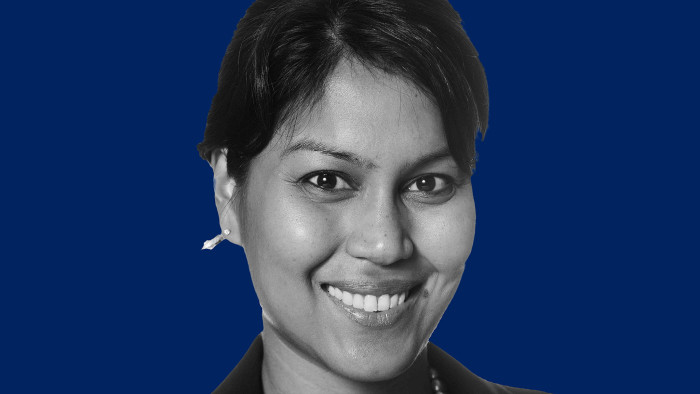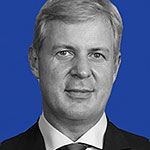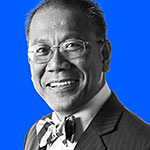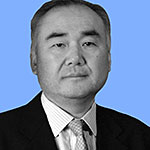Winners of the Asia-Pacific Innovative Lawyers awards 2017

Roula Khalaf, Editor of the FT, selects her favourite stories in this weekly newsletter.
Overall winner: Sophie Mathur
Partner and global co-head of innovation
Linklaters
An epiphany that innovation is not only about technology was a turning point in Sophie Mathur’s campaign to convince her firm that it was time to change. She set about fostering a culture that would ensure Linklaters makes the most of lawyers’ creativity.
Ms Mathur, based in Singapore, is one of the firm’s global co-heads of innovation. She has been at the forefront of Linklaters’ approach to the use of artificial intelligence. One of the innovations of which she is especially proud is the Nakhoda program, which can read, analyse and report on volumes of documents regardless of practice area. Her activities extend beyond making lawyers more efficient: she is also instrumental in improving flexible work options and career options for millennials.
In corporate practice, Ms Mathur has focused on start-ups on an affordable basis, which has led to the firm acquiring tech-oriented clients such as Chope, Otonomos, and Pie — which was Google’s first Singaporean acquisition.
Ms Mathur is working on a submission to local regulators to support the use of blockchain technology for corporate governance on behalf of Otonomos.
***
Andrew Cunningham
Partner and innovation leader
MinterEllison

In his full-time, non-fee-earning role, Andrew Cunningham is using innovation to underpin strategy at MinterEllison.
The law firm is the largest one based in Australia, with more than 200 partners and 700 lawyers in total. Established in Sydney 190 years ago, MinterEllison has offices in eight Australian cities and internationally in New Zealand, mainland China, Hong Kong, the UK and Mongolia.
Mr Cunningham is a former employment partner, who managed the Sydney and Perth offices. He is currently a member of the executive leadership team and his experience is invaluable as he tells colleagues of the importance of innovation in business strategy.
“The profession for the most part is viewing disruption as simply another hurdle to overcome rather than a complete shift in the way we do business,” he says.
Mr Cunningham’s work takes many forms and he involves colleagues with programmes that include design-thinking, artificial intelligence, hackathons and collaborative innovation platforms.
***
John Denton
Chief executive
Corrs Chambers
Westgarth

John Denton is a law firm leader with connections in high places. He is one of the founders of the B20, the business reference group of the G20 group of leading nations. The B20 was formed after Mr Denton had put the idea to Kevin Rudd, then Australian prime minister, as a way to keep G20 members focused, and adding weight to its deliberations. He is now co-chair of the B20 task force on financing growth and infrastructure.
Mr Denton’s interests stretch beyond business: he is chairman of Australia for UNHCR, the UN’s refugee agency. He is also part of the chairmanship of the International Chamber of Commerce in Paris. He has helped both organisations create a platform to formulate a private-sector response to the global refugee crisis.
Mr Denton has been instrumental in making his firm one of the most innovative in Australia, bucking the trend for firms to merge or form alliances with other law firms. He is a champion of global connectivity. “We believe that our connectedness will be the source of our power and influence in this century,” he says.
***
Archana Kotecha
Head of legal
Liberty Asia

Making the transition from being a corporate lawyer to one focused on human rights was tough for Archana Kotecha, the head of Liberty Asia’s legal programme, based in Hong Kong. But it was a move she felt she had to make: “The first time I really felt like a lawyer was the day I understood how the law could be used creatively to protect vulnerable people.”
Ms Kotecha grew up in Mauritius and studied political science at the London School of Economics before being admitted to the English bar and practising corporate law at two City firms. Her switch to human rights took her through roles at the Kurdish Human Rights Project, the UN High Commissioner for Refugees and the Immigration Advisory Service.
In her post at Liberty Asia, she works closely with law firms in Southeast Asia to conceptualise ways to combat trafficking using legal process. For example, Ms Kotecha has worked with the law firm Ropes & Gray to produce research on connections between corruption and human trafficking.
***
Net Le
Partner
LNT & Partners

Building a law firm in a country where a legal framework is still developing is no mean feat but Net Le has accomplished just that.
LNT & Partners operates in Vietnam and since 2006 has grown to serve leading Vietnamese and international clients.
Mr Le, as head of the firm’s infrastructure and financial services group, tackles complex commercial problems for clients. He strives to bring international standards to Vietnam’s courts, and makes everyday changes to his practice to advance his firm and the profession. Examples include setting up forums in which lawyers and clients can come together.
He likes to combine academic theory and practice in his work. “I want to use theory as a foundation to find solutions in practice and use practice as a source to reform theory,” he says. Mr Le studied for his bachelors degree in Warsaw, Poland, and his masters in Leuven, Belgium. He followed this with a PhD in law at the London School of Economics, and continues to lecture at Ho Chi Minh City University of Law.
***
Masakazu Masujima
Partner
Mori Hamada & Matsumoto

Masakazu Masujima is an archetype of the modern international lawyer: he is qualified in both Japan and the US, has experience of Silicon Valley and a record of nurturing financial technology in Japan.
Mr Masujima has worked in the public sector and private practice and with government and international bodies. This wide experience has enabled him to “change the mindset of Japanese financial institutions” from super-conservative to being open to innovation.
He has helped develop Japan’s fintech industry by educating entrepreneurs on financing terms and developing a Japanese version of convertible equity for the sector. He has also formed a not-for-profit organisation to promote fintech businesses and helped create a legal framework to facilitate their development.
Mr Masujima would like to see change in how the legal profession collaborates with other professionals. His motto is “think like an entrepreneur” and he feels that this means having an intense focus on clients.
***
Astrid Raetze
Partner
Baker McKenzie

Convincing lawyers that change is coming and that it will disrupt everyday work is a difficult task: traditionally, they believe they are immune to disruptive change. Astrid Raetze, however, saw how the confluence of artificial intelligence, cyber security and new billing practices would affect her firm and her clients in financial services.
Ms Raetze says she has had to be “a strategist, a futurist, an adviser and a lawyer all in one”. Her explanation of how trends would affect people resulted in her appointment as chair of the innovation committee for Baker McKenzie in Australia.
Her other achievements include establishing the firm’s global fintech group, implementing flexible working arrangements and leading a design-thinking initiative.
Ms Raetze believes that applying a more philosophical and multidisciplinary process to solving problems for clients could make lawyers’ work more enjoyable, advance women and result in better working practices and better advice for clients.
***
Sok Siphana
Managing partner
Sok Siphana & Associates

The career of Sok Siphana, the principal of Phnom Penh firm Sok Siphana & Associates, has spanned government, international development organisations, financial institutions and private practice.
Mr Sok was driven to help rebuild Cambodian society after two decades of civil war that had led to him becoming a refugee. He gained law qualifications in both the US and Australia but chose to return home when the conflict ended. In 1999 he became a government minister and steered the country towards membership of the World Trade Organisation. He also helped develop Cambodia’s legal system, compiling the country’s laws and regulations, and was the first secretary-general of the Cambodian bar association. He is dedicated to inspiring young Cambodians and empowering female entrepreneurs.
Mr Sok says he would like to reduce the influence of the international community in the Cambodian legal profession. He feels that while there has been a strong emphasis on human rights, the commercial practice areas of law also require attention to develop.
***
Philippa Stone
Partner
Herbert Smith Freehills

Philippa Stone is considered by her clients to be the best mergers and acquisitions lawyer in Australia.
Ms Stone is joint head of the equity capital markets practice at Herbert Smith Freehills, which has helped clients raise more capital in the past 20 years than any other Australian law firm. She is often called in on the most challenging bids and acquisitions, such as the contested bid by Qube for Asciano, the ports and rail operator, in 2016.
Ms Stone is also responsible for developing the accelerated rights offer structure. This allows retail shareholder participation in capital raisings without compromising the ability of issuers and underwriters to place capital to institutional shareholders in a much shorter time period.
While Ms Stone is accredited as an individual lawyer in many awards and rankings, she says she is inspired by her colleagues at Herbert Smith Freehills. “We work together to achieve results we could not achieve as individuals,” she says.
***
Xiao Wei
Managing partner
JunHe

Xiao Wei, managing partner of one of the leading law firms in China, says one of his hardest tasks has been to reform the partnership structure of his firm — revealing that lawyers everywhere face much the same challenges, regardless of jurisdiction. Yet Mr Xiao has managed to change the firm’s remuneration system, centralise resources and launch a new knowledge-sharing and collaboration app.
He draws his inspiration from his experience in the public sector at the China Securities Regulatory Commission, and in the private sector as an independent director on several company boards. He believes artificial intelligence “can play a large role in the development of the legal profession” — and that it could change the legal landscape. He can even envisage an initial public offering for a Chinese law firm.
Mr Xiao’s initiatives show how intense the pressures to change are for law firms across the world. His forward-thinking would rank him alongside any innovative law firm leader in the more developed markets of the UK, US and Australia.
Comments